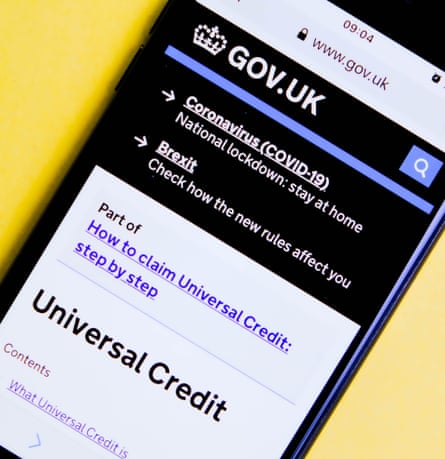A PhD student has been told by Department for Work and Pensions (DWP) the she owes more than £17,000 in overpaid benefits because of mistakes it made when assessing her claim for universal credit.
Vikki Reid, who is in her mid-3os and widowed with an eight-year-old child, applied for the benefit when she started her research in 2019. She supplied full details of her course and the stipend she had been granted by the university, and had no reason to believe anything was wrong when she was told she was entitled to receive £1,316 a month. She lives in Cornwall where rents are high, so her application included help with her housing costs.
Two years later, however, she was told that she had been overpaid and presented with a bill for £17,233. Her universal credit entitlement was set to fall by 50% a month, and the sum she receives was to be cut further as the DWP started to claw back the cash it admits it paid her as a result of its own mistakes.
Universal credit £20 top-up will end this autumn, MPs are toldRead more
“The errors that were made were all on their side,” she says. “We will be below the poverty line. I don’t think I can justify the stress and emotional effort of doing the PhD if that is the case.”
Universal credit was introduced in 2013 and rolled out to replace a number of other payments, including income support and other in-work benefits. Currently payments include a £20 uplift that is set to end in the autumn.
The standard allowance for a single person aged over 25 is currently £411 a month, and there are extra payments of up to £282 a month each available for a family’s first two children. On top of this, there is a housing element available to help towards rent. Other income and savings are taken into account when a claim is made, and monthly payments can be adjusted as a result.
Reid’s PhD working on renewable energy at the University of Exeter brings with it a stipend to cover expenses from the Engineering and Physical Sciences Research Council, which, based on her hours, is worth £11,500 a year. When her application for benefits was processed, the whole payment seems to have been disregarded.
No one noticed until, last autumn, Reid notified the DWP that she was dropping her hours because she could not get enough childcare to work as normal. This prompted a review of her claim and a letter saying that between January and December last year she had been overpaid by just under £1,600.
At this point she was told that 30% of her stipend should have been taken into account, and that she owed several months’ overpayments of £145 a time.
With the help of her dad, Reid appealed against this. But there was worse to come. The new assessor decided that the second assessment was also incorrect. In a lengthy document explaining their decision, the assessor said “there appears to be a misunderstanding” and “your stipend is to be treated as a grant for UC purposes”. Under the rules, this means that the whole payment has to be counted, after tuition fees and a £110 a month allowance for books and travel.
 View image in fullscreenThe DWP can recover universal credit overpayments even if the situation was down to them. Photograph: Martin Lee/Alamy
View image in fullscreenThe DWP can recover universal credit overpayments even if the situation was down to them. Photograph: Martin Lee/Alamy
The assessor wrote: “I acknowledge that you did supply evidence with respect to your student income in an appropriate time but due to an administrative error, your student income was not calculated and included in your UC award.”
Reid is not alone in facing a bill for overpayments. Between July 2020 and the end of June this year, advisers at the charity Citizens Advice heard from more than 3,500 people who needed help with benefits overpayments. During the same period, there were more than 50,000 views of its website pages dedicated to the subject.
Unlike with previous benefits, the DWP can recover overpaid universal credit even if it is to blame for the error, although Treasury guidelines do allow it to opt not to in exceptional circumstances. Recovery is done through cuts to monthly benefits payments, taking money directly from an employee’s wages, or a court order.
Citizens Advice says it has seen cases of universal credit overpayments where notification came completely out of the blue. In one instance, a single parent who was already in debt and using food vouchers was told they owed £500 but not why, and they struggled to contact the DWP.
Rachel Ingleby, a benefits expert at Citizens Advice, says in most cases, the DWP will try to recoup money for a universal credit overpayment via a deduction. “This means they’ll reduce the amount of benefits you’re paid each month until the debt is repaid,” she says.
“Of course, when deductions come out of the blue, that can make it really hard for people to manage their money.”
Vikki thinks her total monthly income will fall by 35%
For Reid, who is not entitled to widowed parents’ benefit because her husband had not built up enough national insurance contributions before he died, the impact of the new decision is devastating.
She thinks her total monthly income will fall by 35% but, despite being told on 9 June that her entitlement would be reconsidered with a matter of urgency, she has not been told what she will get. “I’m still left in limbo, waiting to find out what will happen,” she says.
She is already struggling to find childcare, as Covid has limited her options, and has travel costs to face to complete her research. “I would cycle [to university],” she says, “but that would take longer and mean more childcare costs.
“I will definitely have to leave my PhD if my income is reduced to the basic universal credit entitlement for someone with one child. I am so devastated by this, I did absolutely nothing wrong, but me and my child will have to pay. We already pay the burden of being a widowed-parent family.”
After Guardian Money got in touch, DWP said it would look again at Reid’s situation.
A spokesperson said: “We have paused the repayment activity and are carrying out a further review of this claim. We are in contact with Ms Reid and will advise and support her through this process.”
The DWP says the overwhelming majority of benefits are paid correctly and on time, and that there are official errors in less than 1% of cases.
It says seeks to recover any overpayments without creating financial hardship, and that those who are struggling can contact its debt management unit. It says if the repayment rate it proposes is too high, a lower rate can be discussed.
Reid says she will continue with tribunal action to get the decision overturned, but she is relieved that her case is being looked at again.
“I don’t think any one person at universal credit or the DWP is out to cause poverty and inflict misery, but the policy doesn’t consider individuals, or treat us as people with lives,” she says. “The system is a poverty trap, and written into the law now is the fact the people who are poor enough to need benefits, have to pay when the DWP makes a mistake, however big or small.”
How does the DWP recoup money from benefits overpayments?
Citizens Advice can help if you have been hit with a bill for overpayments. Here is how the system works:
-
The DWP has discretion over how it recovers overpayments, and how much.
-
Overpayments of universal credit are often recovered via deductions to future universal credit payments.
-
The maximum amount that can be deducted is 25% of the universal credit standard allowance, DWP says.
-
Citizens Advice says, in practice, deductions tend to be taken at 30%, 25% or 15% of the standard allowance, with 30% normally the rate if a person is found guilty of an offence or has accepted a penalty in connection with the overpayment.
-
The DWP can reduce the amount of the debt it recovers each month if someone is experiencing financial hardship as a result. Citizens Advice says it can support people with this process.
This article was amended on 12 July 2021 to clarify that the housing element of universal credit can help towards rent, but may not necessarily cover it; and to remove an incorrect statement that this element can cover mortgage interest costs. Help towards those costs can only be gained via a repayable government loan.



